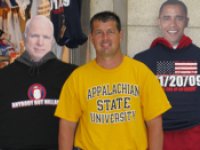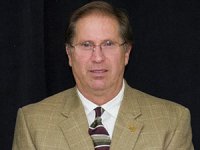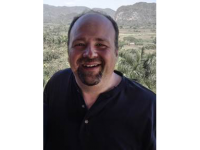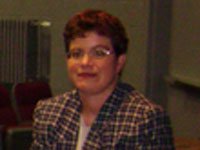
Phillip Ardoin (Political Science)
Ph.D, M.A., Louisiana State University; B.A., Marymount University
My research and teaching interest focus on a diverse number of issues related to contemporary American Politics. Both my research and classes aim to examine contemporary American Politics from a scholarly perspective and to address the validity of various hypotheses and ideological perspectives. My most recent research has examined the levels and sources of partisan polarization in the U.S. Congress and the N.C. General Assembly.
I enjoy teaching honors students because of their ability to think critically and to challenge both my views and the views of their fellow classmates. I also enjoy the opportunity honors courses provide to examine issues at a level deeper than traditional courses.

Kristan Cockerill (Interdisciplinary Studies)
Ph.D., University of New Mexico (American Studies Environment, Science and Technology); M.S., University of Illinois (Journalism); B.A., University of Illinois (Political Science)
My research and teaching focus on environmental policy – especially water policy. Throughout my career I have worked on diverse projects at the local, state, and federal levels. Most recently I have focused on social and communication issues relevant to making water management decisions. My courses are all interdisciplinary and encourage students to explore the relationships among history, economics, politics, and culture in thinking about how we make environmental policy decisions.
I enjoy teaching honors courses because of the small class size, which allows more opportunities for peer-to-peer and experiential learning. Additionally, the Honors College encourages interdisciplinary thinking and therefore the students often already have some experience with that style of learning.

Michael Dale (Leadership and Educational Studies)
Ph.D., University of Wisconsin-Madison; M.A., B.S., University of North Carolina Chapel Hill
I have been teaching at ASU since 1988 and teaching in the Honors program for the past 18 years. As a philosopher of education all of the classes that I teach reveal I think my unwavering commitment to a liberal arts education, to exploring and examining with students difficult questions concerning what it means to live a meaningful human life and to live in relationship with other human beings and other nonhuman animals with which we share our natural world. I am especially interested in how philosophy and literature open up and address these questions and issues.
I love teaching the first year honors seminar for the opportunity it provides to engage with serious minded students in reading and conversation focused on the all-too-human questions of what we are and what we are doing and what we ought to do in our lives. I appreciate the opportunity to introduce students to the joy, inspiration, struggle, confusion and pain of joining in an ongoing conversation as each of us aspires towards some degree of expanding comprehension, clarity, and discernment about our lives and the lives of others.

Jeanne Dubino (University College)
Ph.D., University of Massachusetts-Amherst; M.A., University of Delaware; B.A., Boston College
Since the beginning of my career, as a graduate teaching assistant at the University of Massachusetts, I had the opportunity to teach composition with Honors students, and, most recently, I had the good fortune to teach world literature with Honors students at Appalachian. Between then and now I have taught a range of classes in British, American, and world literature; courses in writing, speech, and literary theory; and interdisciplinary courses in culture and women’s studies. One of my most interesting was an upper division class called “Women and Their Environments” that I co-taught with five professors from biology, computer science, psychology, physical education, and political science. Of late, because of my many travels and teaching experiences abroad (e.g., in Turkey and Kenya), I have become increasingly interested in teaching travel literature. Travel writing is by definition interdisciplinary, and above all, through the eyes of travelers, we can vicariously experience what it means to explore places and get to know people from around the world.
In Honors classes students are encouraged to look at ideas, subjects, texts, from a variety of perspectives. Along with students I love to make connections among the many fields of knowledge and disciplines.

Leigh Dunston (Finance, Banking, and Insurance)
J.D., Georgetown University; B.S., St. Joseph University (International Relations)
Teaching at Appalachian has been a wonderful way to add to a professional life that has been full but never so fulfilling as when I have been teaching at ASU since 2002. I practiced law for many years as a civil trial lawyer and learned during that time that I loved teaching my younger colleagues. The reason, I think, is because I learn so much when I teach and that is an extraordinary pleasure. At Appalachian I have taught "Legal Environment of Business" and "International Business Transactions." Recently, in the past 4 years I created a course titled "Tycoons Titans Founders Financiers and Blaggards" which has been taken by many Honors students and which focuses on the broad sweep of American financial and economic history as learned and discussed through the lives of the most impactful Titans in American history. Their stories and exploits and their ethical challenges bring the sweep of American financial history to life in a way that is compelling and thought provoking. I love teaching this course as ambitious as it is.
Honors students challenge me and I enjoy trying to make the courses as enlightening as possible for students who are seeking deep knowledge and inspiration for creative and critical thinking. Integrating several concepts imbedded in the subject of the courses allows the students to enjoy in a deep way the pleasure of reaching insights that are at the heart of critical thinking and achieving a fuller more thoughtful and rewarding life. This gives me great pleasure.

Louis B. Gallien Jr. (Educational Leadership)
Ph.D. (educational policy), M.A. (history) UNC Greensboro
Louis Gallien was the Dean of the Reich College of Education previously to his teaching in the Honors College. As a professor in interdisciplinary studies at previous institutions, he taught in the Honors Programs at Millsaps and Spelman Colleges. He has taught on both undergraduate, master and doctoral levels since 1992. His major research efforts have centered on African American culture, history, religion, sociology, pedagogy and issues centered on Civil rights. He was awarded six major fellowships: Pew Fellow (Wheaton College), Wye Fellow (Aspen Institute), and Rackham Fellow (University of Michigan, NEH Fellow (Haverford College), Mellon Fellow (Salzburg Seminar) and the Georgia Governor’s Teaching Fellow (University of Georgia) He is the co-author of two books on African American pedagogy on a higher education level from Allyn and Bacon and Teachers College Presses in 2004 and 2006 respectively. He has won three teaching awards with one being at the University level. He holds a distinguished service award from Spelman College where he served as Clerk of Faculty. He is presently working on two manuscripts: one with fellow Reich College colleague, P.J. Nelsen on The Demise of Public Education and the Diminution of American Democracy and another one titled: A Precarious Future: The Demise of Exclusive Colleges in America. His latest publications have been two chapters in books by New York University Press, Afropentecostalism (Crossing over Jordan: Navigating the Music of Heavenly Bliss and Earthly Desire in the careers of Cross Artists in the 20th Century and; from Wiley-Blackwell Press in Oxford, England, W-B Handbook on Religion. (The Double Conscious Nature of American Evangelicalism on Civil Rights during the Progressive Era) He is presently on the University Humanities Council, Doctoral Policy Program Committee, Williams Thesis Award Committee, and Chancellor’s Scholarship Committee at ASU. He has taught an Honors Course last fall titled: Slavery and American Capitalism. At present he is teaching two seminar courses on: The roles and representations of Southern women in Novels by 20th century southern women authors. And, The American Civil Rights Movement of African American, Women and LBGT groups.

Joseph J. Gonzalez (Global Studies and Interdisciplinary Studies)
Ph.D., University of Michigan (International History)
During my first few years at Appalachian, I taught freshmen primarily, usually in general education, most often in interdisciplinary programs. Recently, my research interest has merged more fully with my teaching; now I teach students of all ages in Global Studies, with a special emphasis on my area of research, Cuba and its relationship to the US. I also teach the theory and practice of interdisciplinary to majors in the Interdisciplinary Studies Program. It's a full load, to be sure, but I always enjoy making time to teach a section of HON 1515 whenever possible.
I love teaching in honors because of the students. They are curious, ready to work, and most of all, ready to learn. It's always a pleasure not only to introduce honors students to new, interesting, and (dare I say) cool material and concepts, but also to watch them grow intellectually, cognitively, and personally. Not surprisingly, I have found myself learning from my honors students, who never fail to challenge me to be my absolute best all the time.

Tom Hansell (Appalachian Studies)
B.S., Ohio University School of Telecommunications
As a documentary filmmaker, my work for the Appalshop media arts center has screened nationally on PBS and at film festivals internationally. I draw heavily on this experience as I teach courses in Appalachian culture and documentary production.
I enjoy the high level of focus that honors students bring to the classroom. I work to make my class as interactive as possible and honors students always rise to the challenge of full participation. As a result, my students take an active role in defining the projects my class produces.

Alexandra Hellenbrand (Global Studies, Foreign Languages and Literature)
Ph.D., Pennsylvania State University
I like teaching HON courses because the students are interested and interesting; they respond well to creative topics and approaches. One of the advantages that students have taking these courses is the fact that professors become creative learners along with them in class—I love teaching students who are willing to go on creative journeys in a single course that may take us on a Grail search from 13th century German literature to Monty Python and even the Renaissance Festival in Huntersville, NC. We all have fun learning from one another! I have a variety of diverse but related teaching and scholarship areas. I have two areas of training: one is German language, literature and culture. The other is medieval studies and Arthurian romance. I have taught courses in Honors on Fairy Tales, sagas and fantasy, Arthurian Legends, and Fin de siecle Vienna. I have been the second reader on several honors theses, notably in collaboration with the School of Music.

Rick Klima (Mathematical Sciences)
Ph.D., M.S., North Carolina State University; B.S., Liberty University
My areas of research and favorite subjects to teach are the mathematics of election theory, cryptography (the art/science of writing and breaking secret messages), and coding theory.
I love studying areas in which mathematics overlaps with other disciplines and with popular culture. Teaching honors courses gives me an avenue for exploring some of these areas with talented students who otherwise may never be exposed to how mathematics is relevant in their everyday lives.